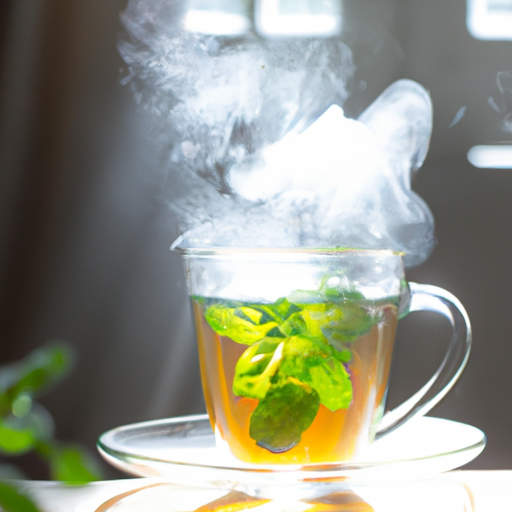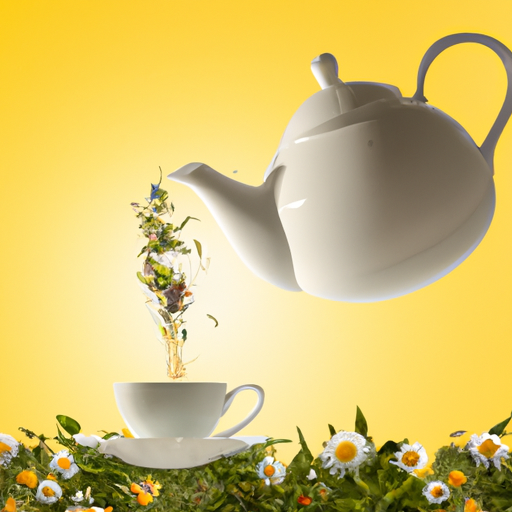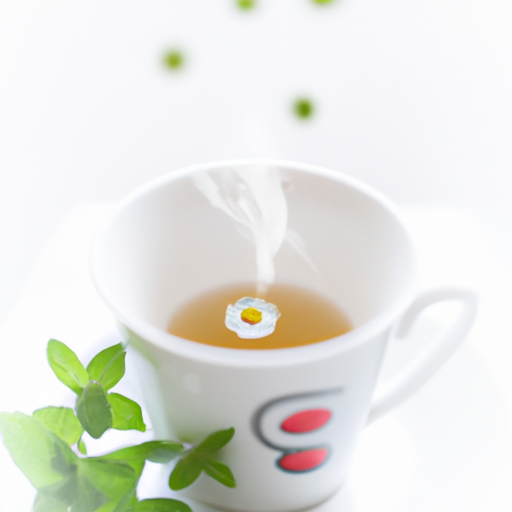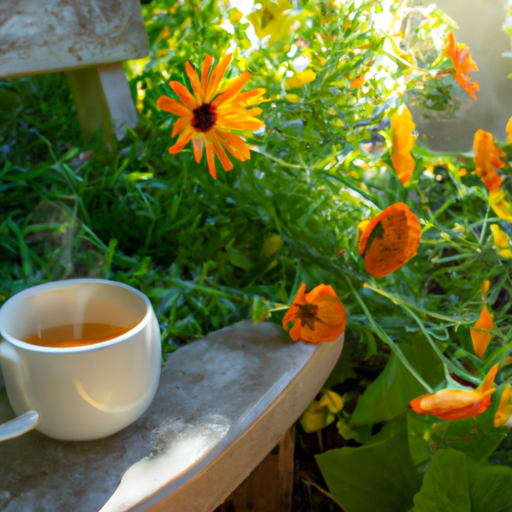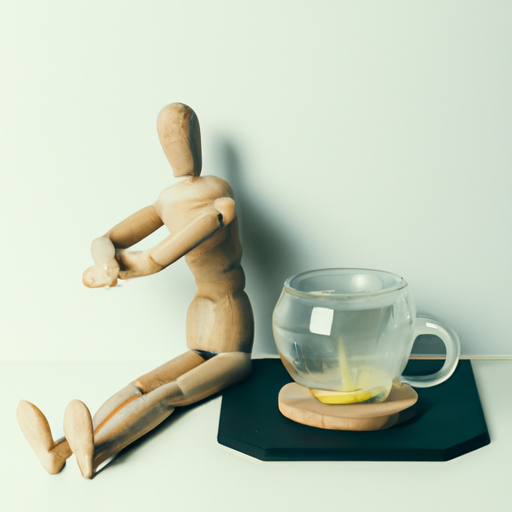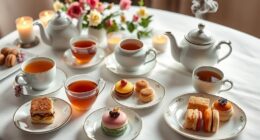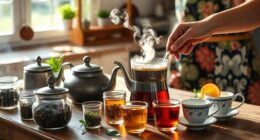Did you know that more than 158 million Americans consume tea every day? It’s not surprising, given the many health benefits that herbal teas offer.
One particular herbal tea that has gained popularity in recent years is peppermint tea. Not only does it have a refreshing taste, but it also offers a wide range of benefits for our health and well-being.
Peppermint herbal tea is known for its ability to soothe digestive issues, such as bloating and indigestion. It can also alleviate headaches and migraines, providing natural relief without the need for medication. Additionally, this tea has been found to relieve menstrual cramps, making it a go-to remedy for women during that time of the month.
But the benefits of peppermint tea don’t stop there. It can combat bad breath, boost the immune system, aid in weight loss, and even promote relaxation and better sleep. With all these incredible benefits, it’s no wonder why peppermint herbal tea has become a staple in many households.
If you’re looking to improve your health and well-being naturally, consider incorporating peppermint herbal tea into your daily routine. Its refreshing taste and holistic benefits will leave you feeling revitalized and rejuvenated.
Key Takeaways
- Peppermint herbal tea helps with digestive issues like bloating and indigestion.
- It can alleviate headaches and migraines.
- Peppermint tea is beneficial for relieving menstrual cramps.
- It aids in weight loss by acting as an appetite suppressant and boosting metabolism.
Soothe Digestive Issues
Peppermint herbal tea can help you soothe those pesky digestive issues. When it comes to finding natural remedies for indigestion, peppermint tea is a go-to option. This aromatic tea has been used for centuries to alleviate digestive discomfort and promote overall wellness.
The benefits of herbal teas for digestion are well-known, and peppermint tea is a standout in this regard. One of the key components of peppermint tea is menthol, which has antispasmodic properties. This means that it can help relax the muscles of the gastrointestinal tract, easing symptoms of indigestion such as bloating, stomach pain, and gas.
Peppermint also stimulates the flow of bile, which aids in the digestion of fats. This can be particularly helpful for those who struggle with fatty or greasy foods.
In addition to its soothing effects on the digestive system, peppermint tea has a refreshing taste that can help alleviate headaches and migraines. The menthol in peppermint has a cooling effect that can help ease tension and reduce pain. So, if you’re looking to not only soothe your digestive issues but also alleviate headaches and migraines, peppermint herbal tea is a natural and holistic option to consider.
Alleviate Headaches and Migraines
Sip on a cup of this refreshing brew and watch those pesky headaches and migraines fade away like a distant memory. Peppermint herbal tea has long been known for its soothing properties, and it can provide natural relief for those suffering from headaches and migraines. The menthol in peppermint helps to relax muscles and relieve tension, which can be a common cause of headaches. Additionally, peppermint has been found to have analgesic and anti-inflammatory effects, making it an effective headache remedy.
When it comes to migraines, peppermint herbal tea can be a valuable tool in your natural migraine relief arsenal. Migraines are often accompanied by nausea and sensitivity to light and sound, and peppermint’s calming properties can help alleviate these symptoms. It can also help to reduce the intensity and duration of migraines, allowing you to get back to your day.
As I transition to the next section about relieving menstrual cramps, it’s important to note that peppermint herbal tea can also be beneficial for this particular issue. Menstrual cramps can be debilitating, but sipping on a warm cup of peppermint tea can provide relief by relaxing the muscles in the uterus. So, let’s explore how this herbal tea can help ease those monthly discomforts.
Relieve Menstrual Cramps
When experiencing menstrual cramps, you can find relief by incorporating a warm cup of peppermint tea into your routine, allowing the calming properties of this herbal remedy to relax the muscles in your uterus. Peppermint tea has been used for centuries as a natural remedy for various ailments, including menstrual cramps. Its soothing effects can help alleviate the pain and discomfort associated with this monthly occurrence.
Peppermint tea contains menthol, which acts as a muscle relaxant and pain reliever. When consumed, the menthol works to reduce the intensity of uterine contractions, thus providing relief from menstrual cramps. Additionally, the tea’s anti-inflammatory properties can help reduce inflammation in the uterus, further easing discomfort.
To provide you with a visual representation of the benefits of peppermint tea for menstrual cramps, refer to the table below:
| Benefit | Description |
|---|---|
| Relaxation | Peppermint tea helps relax the muscles in the uterus, providing relief from cramps |
| Pain Relief | The menthol in peppermint tea acts as a natural pain reliever |
| Anti-inflammatory | Peppermint tea reduces inflammation in the uterus, easing discomfort |
| Holistic Approach | Peppermint tea is a natural remedy that offers an alternative to conventional treatments |
| Calming | The soothing properties of peppermint tea help to calm both the body and mind |
By incorporating natural remedies like peppermint tea into your routine, you can find relief from menstrual cramps without relying solely on traditional medications. In the next section, we will explore how peppermint tea can also combat bad breath.
Combat Bad Breath
To freshen your breath and combat unpleasant odors, imagine sipping warm, aromatic peppermint tea. This delightful beverage is not only a natural remedy for bad breath but also improves oral hygiene. Here are four reasons why peppermint tea can help combat bad breath:
- Peppermint has natural antibacterial properties that can kill the bacteria causing bad breath.
- It stimulates saliva production, helping to wash away food particles and bacteria in the mouth.
- Peppermint tea soothes an upset stomach, which can contribute to bad breath.
- The menthol in peppermint tea provides a refreshing and cooling sensation, masking unpleasant odors.
By incorporating peppermint herbal tea into your daily routine, you can enjoy improved oral hygiene and fresh breath.
Now, let’s move on to the next section and explore how peppermint tea can boost the immune system.
Boost Immune System
By incorporating peppermint herbal tea into my daily routine, I can strengthen my immune system and enjoy the benefits of improved overall health. Peppermint herbal tea is a natural and holistic way to boost my energy levels and improve my focus throughout the day.
The invigorating aroma and taste of peppermint awaken my senses and provide a refreshing burst of vitality. This revitalizing tea contains antioxidants and antimicrobial properties that help to combat harmful bacteria and viruses, which in turn strengthens my immune system.
Boosting my immune system is essential for maintaining good health and preventing illnesses. Peppermint herbal tea contains essential nutrients like vitamin C and minerals that support my immune function. These nutrients help to enhance the production of white blood cells, which are vital for fighting off infections and diseases. By regularly drinking peppermint herbal tea, I can give my immune system the boost it needs to stay strong and resilient.
In addition to its immune-boosting properties, peppermint herbal tea also helps to improve my focus and mental clarity. The energizing nature of peppermint stimulates my brain and enhances my cognitive function. It helps me stay alert and focused, making it easier to concentrate on tasks and achieve my goals.
Transitioning into the subsequent section about how peppermint herbal tea can aid in weight loss, incorporating this invigorating tea into my daily routine not only boosts my immune system and improves my overall health but also supports my weight loss journey.
Aid in Weight Loss
After exploring how peppermint herbal tea can boost the immune system, let’s delve into another amazing benefit: aiding in weight loss. As someone who values natural remedies, I’m fascinated by how this simple beverage can assist in shedding those extra pounds.
One of the key ways it does this is by boosting metabolism. The combination of peppermint’s refreshing flavor and its active compounds stimulates the body’s metabolic processes, leading to increased calorie burning and fat breakdown.
Additionally, peppermint herbal tea acts as an appetite suppressant, helping to curb cravings and reduce overall food intake. By incorporating this delightful tea into your daily routine, you can support your weight loss journey in a holistic and natural way.
Now, let’s transition to the next section, where we’ll explore how peppermint herbal tea can promote relaxation and better sleep.
Promote Relaxation and Better Sleep
Transitioning now, let’s explore how sipping on peppermint herbal tea can enhance your relaxation and promote a better night’s sleep. Peppermint herbal tea has been used for centuries to soothe the mind and body, offering a natural remedy for those seeking improved focus and reduced anxiety. The calming properties of peppermint tea can help to relax both the body and mind, allowing for a more restful sleep.
Peppermint contains menthol, which acts as a muscle relaxant, helping to relieve tension and promote relaxation. This can be especially beneficial for those who struggle with anxiety or have trouble unwinding after a long day. By incorporating peppermint tea into your bedtime routine, you can create a sense of calm and tranquility that will ease you into a peaceful sleep.
To better understand the benefits of peppermint herbal tea for relaxation and sleep, let’s take a look at the following table:
| Benefits of Peppermint Herbal Tea for Relaxation and Sleep |
|---|
| 1. Reduces anxiety and promotes relaxation |
| 2. Improves focus and mental clarity |
| 3. Enhances the quality of sleep |
By sipping on a warm cup of peppermint tea before bedtime, you can create a ritual that signals to your body and mind that it’s time to unwind and prepare for rest. So, why not experience the natural benefits of peppermint herbal tea and enjoy a more relaxed and rejuvenating sleep?
Frequently Asked Questions
Can peppermint herbal tea be consumed by pregnant women?
Peppermint herbal tea is generally safe for pregnant women, but it’s important to consult with a healthcare professional. It may help with nausea and digestion, but excessive consumption can lead to heartburn.
Is peppermint herbal tea safe for children?
Peppermint herbal tea can have potential benefits for children with digestive issues. It is important to note the recommended dosage and potential safety concerns, as excessive consumption may lead to adverse effects.
How long should I steep peppermint herbal tea for maximum benefits?
To maximize the health benefits of peppermint herbal tea, steep it for 5-10 minutes. This allows the natural compounds to infuse into the water, promoting digestion, relieving headaches, and soothing the respiratory system.
Can peppermint herbal tea help with sinus congestion?
Peppermint herbal tea can help relieve sinus congestion. For example, Sarah experienced immediate relief after drinking a cup. Its anti-inflammatory properties reduce nasal inflammation, making it an effective natural remedy for allergies and headaches.
Are there any side effects or potential interactions with medications when drinking peppermint herbal tea?
Potential interactions with medications and possible side effects may occur when drinking peppermint herbal tea. It is important to consult with a healthcare professional to ensure it is safe for you based on your specific medical conditions and medications.
Conclusion
In conclusion, peppermint herbal tea is a wonderful natural remedy that offers a wide range of health benefits. It can soothe digestive issues, alleviate headaches, relieve menstrual cramps, combat bad breath, boost the immune system, aid in weight loss, and promote relaxation and better sleep. Interestingly, studies have shown that peppermint tea can help improve cognitive function and memory retention, making it a great choice for students and professionals alike. So why not incorporate this delightful and beneficial tea into your daily routine? Cheers to your health and well-being!

